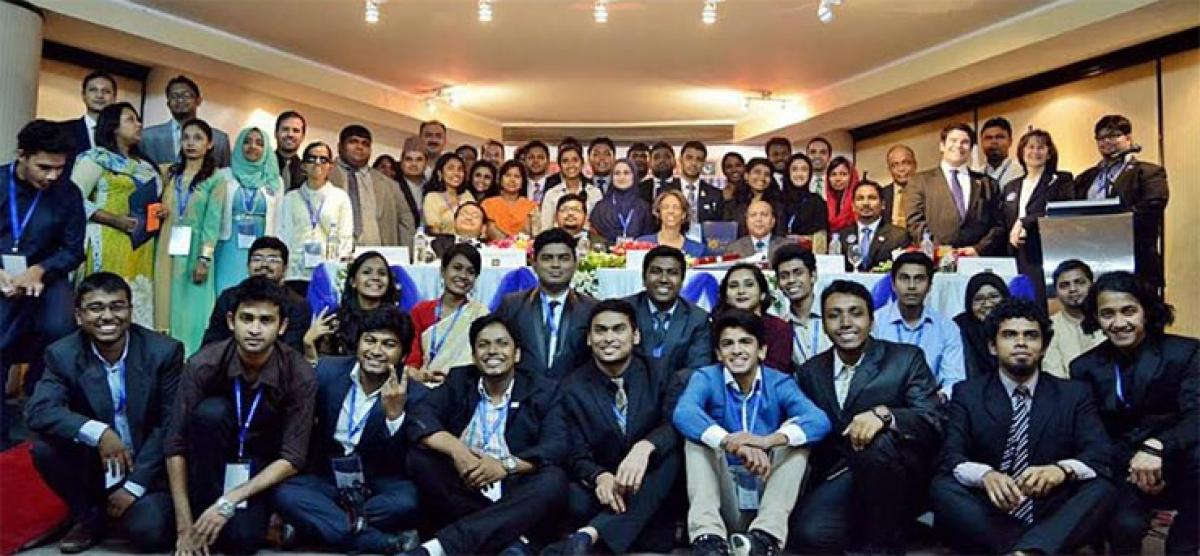Live
- Waqf Board has more powers than Supreme Court: MP Konda
- Govt to roll out mobile cancer screening vehicles in all dists
- VPA holds high-level review on NAVIC Cell 21
- Key leaders to take part in ‘Basti Nidra’ prog
- RINL gets 3 gold awards in Quality Control Circles meet
- Gold rates in Delhi today surged, check the rates on 16 November, 2024
- Gold rates in Vijayawada today surges, check the rates on 16 November, 2024
- We accept CM Revanth’s dare to sleep in homes near Musi: Kishan
- State sees big spike in fine rice output thanks to Rs 500 bonus
- Beautification works to pick up pace in city
Just In
Collaboration is key to disaster management in South Asian

2 Aug 2015 7:31 PM IST

x
Highlights
As part of the Model SAARC Summit 2015, delegates congregating from all over South Asia came together to discuss the role of SAARC in terms of ensuring better disaster management for the region as a whole. The session was inaugurated with the welcome speech from Ratul Dev, the Chairman of the Committee, leading to an introduction session among the delegates.
As part of the Model SAARC Summit 2015, delegates congregating from all over South Asia came together to discuss the role of SAARC in terms of ensuring better disaster management for the region as a whole. The session was inaugurated with the welcome speech from Ratul Dev, the Chairman of the Committee, leading to an introduction session among the delegates.

The uniqueness of the summit lies in the fact that the participants don’t represent their own country but are assigned to represent a different South Asian nation. Thus, the participants develop a good understanding of the other countries in the region other than their own.
After the rules of procedure were reiterated by the Chair, the delegates went forward with the discussion. Two agendas were raised in the house, of which the agenda calling for collaboration in disaster preparedness and management among SAARC countries were taken up after a simple majority was ensured among the delegates.
Joint funds between countries
The discussion started off with the Delegate of India, proposing a formation of joint funds for disaster management in the region which ultimately gained a common consensus in the committee.
The delegate of Maldives, shed light on the National Policy for Disaster Management that Maldives has taken up in 2012 and also the SAARC framework on Disaster management.
A proposal for formation of ‘Rapid response units’ in all SAARC countries was made by the Delegate of Maldives which he pointed would help in mobilization of funds and also ensure rapid response in terms of Medical facilities and relief dispatch.
The delegate of Nepal, highlighted how his nation was one of the worst affected by disasters referring to the series of devastating Earthquakes. The delegate also pointed out how sufficient fund was not available during the earthquakes and that collaboration between the SAARC countries in tackling the disaster was absent.
The Advisor to the committee, Sanjay Neupaune also pointed out how the creation of a common SAARC disaster
Sharing knowledge between key actors
Delegate of Pakistan also reiterated how Pakistan was prone to major disasters. The delegate expressed how sharing knowledge between the key actors in terms of disaster management from all the SAARC nations was key to ensure proper steps post-disaster.
‘If we are aware of the experiences that Nepal has gained when tackling the Earthquake disaster, we can learn and this will help the other SAARC countries’ she added.
The Chair of the session suggested how a thought about Volunteer exchange between the SAARC countries could be though off. If the volunteers who have worked in the Nepal can also work in times of disaster in other regions, this would ensure proper disaster management.
Human Induced Disasters
At this course of discussion, the delegate of Bangladesh raised a fundamental issue with what we term disaster. He pointed out how some forms of disasters may be human induced like building collapses and road accidents and mentioned how these also need to be addressed. He also called for system reforms referring to possibilities for the inappropriate use of funds allocated for tackling disasters.
Saving lives- first priority
The delegate from Afghanistan mentioned how the country she was representing was one of the poorest in the world and was prone to natural disasters. She also emphasized on the implementation of the treaties that are signed among the countries.
The delegate called on the SAARC countries to set their priorities in terms of disaster management. According to her, saving lives should be the first and foremost priority followed by the question of rehabilitation and rebuilding of lost infrastructures.
Physiological support for the victims
The delegate of Bhutan emphasized on the mental support in terms of confidence building that is required for the victims post- disaster. The delegate also called for international collaboration and referring to Act 14 of the Disaster Management Act of Bhutan, demonstrated how his country recognized the need for help from international actors in times of disaster.
The delegate from Sri-Lanka shared experiences of how Sri-Lanka faced the Tsunami on December 26th 2004.
Disaster management preparedness at schools
The delegate of Maldives at this point of discussion raised the point of inclusion of disaster preparedness lessons at schools in different levels.
Collaboration among governments during disasters
The delegate of Bangladesh pointed out to present communication and collaboration gap between the ministries of the South Asian countries in times of disaster and called for bridging of these gaps.The session was adjourned till the next day at this point of discussion.
Monojit Saha

Next Story
More Stories
ADVERTISEMENT
© 2024 Hyderabad Media House Limited/The Hans India. All rights reserved. Powered by hocalwire.com






